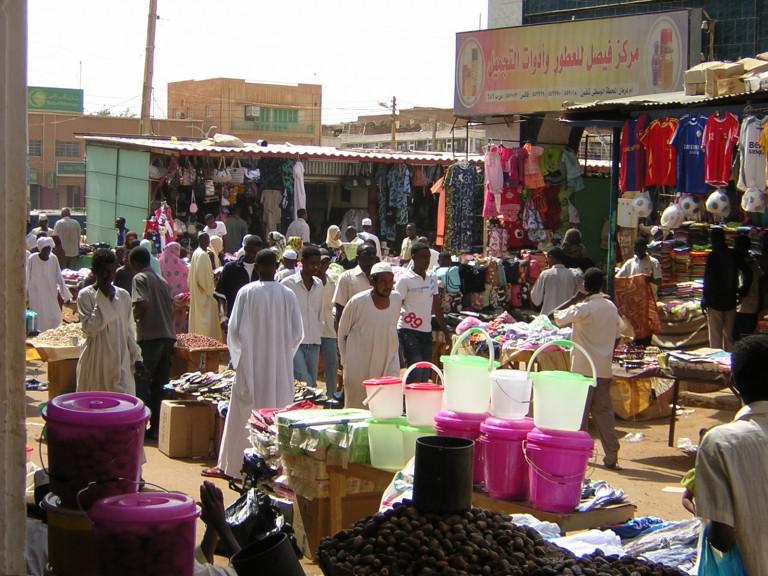With each passing day of the war between the Sudanese Army and the Rapid Support Forces (RSF)—now in its third year—the suffering of Sudanese civilians continues to intensify. The sharp rise in essential commodity prices has placed a tremendous burden on millions of citizens, especially following the devaluation of the Sudanese pound against foreign currencies and the government’s decision to raise the customs dollar rate.
Food and consumer goods have seen significant and sudden price hikes across cities and regions nationwide, alongside new increases in fuel prices that are expected to further affect the cost of living.
Collapse and Crisis
The Sudanese pound has plummeted to its lowest value in history against foreign currencies on the parallel market, with the U.S. dollar reaching 3,200 SDG to buy and 3,188 SDG to sell, according to local traders.
Although various markets continue to operate in conflict-affected areas, they are plagued by severe shortages in essential food items and skyrocketing prices. This situation is worsened by a critical shortage of circulating cash, making daily life extremely difficult for residents of the five Darfur states and the three Kordofan regions. Declining crop prices, sluggish trade activity, disruptions in transport, and commercial stagnation have all compounded the hardship.
Poverty and Desperation
Amer El-Sheikh, a resident of El-Obeid in western Sudan, told Mashawir:
“People are struggling to meet even their basic daily needs. Savings have run out, prices are out of control, and daily jobs have disappeared. Government and private sector salaries haven’t been paid in over two years.”
He added, “The pound’s fall and the hike in the customs dollar have driven commodity prices to unprecedented levels. Most people can no longer afford even a single meal a day.”
He explained that hundreds of thousands now rely on extremely basic meals—often no more than tomatoes, lentils, and onions—as their living conditions deteriorate further each day.
“I don’t believe the government has any viable solutions,” El-Sheikh continued. “Even when temporary currency stabilization measures are taken, commodity prices remain unregulated and unpunished.”
Cash Shortage
The cash crisis has severely impacted markets in conflict zones. People face immense difficulty due to the lack of available physical money, adding to the scarcity and soaring prices of food.
Abdul Karim Al-Tayeb from Al-Fula in West Kordofan told Mashawir:
“Markets here are paralyzed due to an extreme cash shortage. The RSF has blockaded the state, and humanitarian aid hasn’t reached us.”
He noted that the relentless price hikes are pushing living conditions beyond human tolerance, especially during wartime, as most people are displaced, jobless, and penniless. “Even state employees are surviving on the bare minimum,” he said.
“With the worsening crisis, people are turning to digital banking apps to get cash from the market. But they face hefty fees just to get physical money,” Al-Tayeb added.
He described how he had to transfer 100,000 SDG via a mobile banking app to a trader, only to receive 70,000 SDG in cash—a 30% loss—just to buy necessities for his family.
Bartering as a Lifeline
In Darfur, the cash shortage has worsened the famine crisis, especially after food prices surged by more than 300%.
Omar Muhanna, a resident of El-Daein, told Mashawir:
“Banking restrictions and traders’ refusal to accept digital transfers have worsened the cash crunch. Most of the circulating currency has ended up in the hands of border traders and hasn’t returned, especially since exports have stopped.”
He explained that the devaluation of the Sudanese pound and soaring inflation have forced people to barter goods—especially raw agricultural products—instead of using cash, just to obtain basic necessities.
Muhanna noted that this barter economy has led to the shutdown of several livestock markets and created stagnation in agricultural crop trade.
Dire Impact on Citizens
Economic analyst Diaa Hamid told Mashawir that the pound’s depreciation against foreign currencies is having a devastating impact on people’s lives and the overall economy—especially as war, poverty, and unemployment continue to worsen.
He stressed that the war has directly affected key economic indicators, causing a collapse in the local currency and driving inflation upward.
“The decision to raise the customs dollar came at a time when the local currency was already weakening,” Hamid said. “Private sector actors exploited the situation to further raise prices, shifting the full burden onto consumers—worsening the suffering of millions of Sudanese.”
